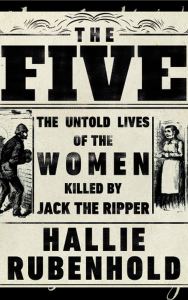 I enjoy following the Baillie Gifford Prize for Non-Fiction (previously known as the Samuel Johnson Prize) because it is the one book prize which consistently picks winners I actually agree with: Chernobyl by Serhii Plokhy, How to Survive a Plague by David France and H is for Hawk by Helen Macdonald to name a few from recent years. I had just finished ‘The Five’ by Hallie Rubenhold when it was announced as this year’s winner on Tuesday and, once again, I think it is another book which really deserves this prestigious award. It is about the “untold lives of the women killed by Jack the Ripper”, namely Mary Ann “Polly” Nichols, Annie Chapman, Elizabeth Stride, Catherine “Kate” Eddowes and Mary Jane Kelly who all died in 1888 in Whitechapel in east London.
I enjoy following the Baillie Gifford Prize for Non-Fiction (previously known as the Samuel Johnson Prize) because it is the one book prize which consistently picks winners I actually agree with: Chernobyl by Serhii Plokhy, How to Survive a Plague by David France and H is for Hawk by Helen Macdonald to name a few from recent years. I had just finished ‘The Five’ by Hallie Rubenhold when it was announced as this year’s winner on Tuesday and, once again, I think it is another book which really deserves this prestigious award. It is about the “untold lives of the women killed by Jack the Ripper”, namely Mary Ann “Polly” Nichols, Annie Chapman, Elizabeth Stride, Catherine “Kate” Eddowes and Mary Jane Kelly who all died in 1888 in Whitechapel in east London.
Rubenhold doesn’t dwell on the gruesome details of the five women’s violent deaths which have been subject to so much speculation and sensationalism. Instead, the central premise of her account rests on the disproportionate attention given to Jack the Ripper’s identity and notorious crimes rather than the lives of those he killed. The piece in the Guardian this week announcing her prize win with a headline describing her as a “Jack the Ripper historian” could not have been more painfully ironic.
Many would assume that the five women would be relatively anonymous figures with very little known about their lives. However, although all five experienced poverty for at least part of their lives, Rubenhold dispels the myth that Jack the Ripper preyed on prostitutes, with only two of the victims ever proven to have been working in the sex trade. Alcoholism was much more prevalent with four of the five being addicts. The double standards by which women are measured are another common link, with all five being mistreated by men in some way.
Rubenhold’s research draws on census records and a vast number of other sources to retrace the steps of these women leading up to their deaths. Where there are gaps and inconsistencies in the available sources, she draws sensible and convincing conclusions about the most likely course of events or circumstances, based on the existing evidence or absence of evidence. She also expands on the biographies of the five women with more general context about the era, such as Peabody housing estates, treatment for alcoholism, and the Princess Alice disaster in the River Thames.
This is an eye-opening and skilfully written book. In terms of background information about the socioeconomic history of the era, there may not be much here which is particularly new to those who are already knowledgeable about Victorian London, but the frame in which it is written is both original and powerful, finally giving voice to the five women whose stories have been unheard for so long.





I saw this reviewed in one of the ‘serious’ newspapers but forgot to make a note of the book title and then of course the newspaper got thrown out. Thank you for re-uniting me with what sounds like a fascinating book. I wonder why people were so quick to believe all 5 women were prostitutes …
LikeLike
The last victim was, so it seems everyone assumed the others were too…
LikeLike
I loved this book so much and reading your review makes me think I should get to other Baillie Gifford prize winners as well. I didn’t know much about Victorian London prior to reading this, so I really loved the way the author brought that time period to life with these women’s stories. I thought she did a good job showing both their personal stories and the general structure of society at the time.
LikeLike
Yes, I agree!
LikeLike
Pingback: #Winding Up the Week #97 – Book Jotter
Pingback: My Books of the Year 2019 | A Little Blog of Books
Pingback: Announcing the NOT the Wellcome Prize and Blog Tour | Bookish Beck